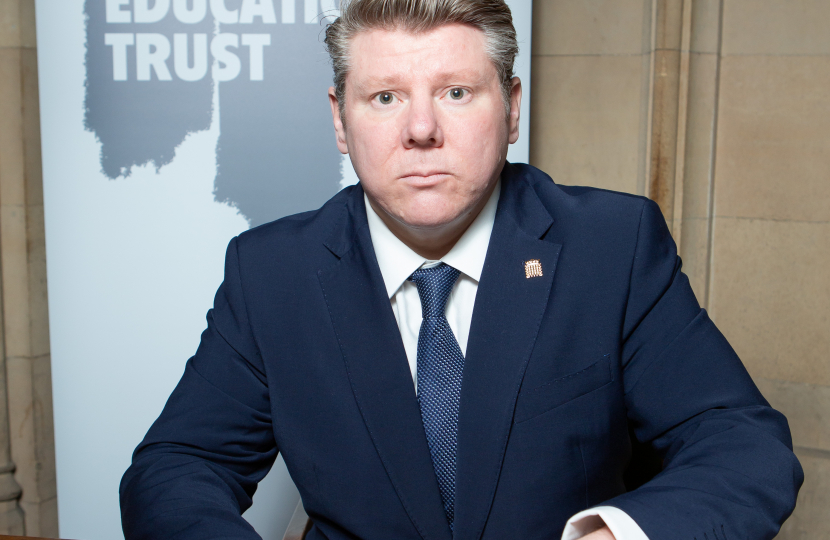
Dean Russell MP signed the Holocaust Educational Trust’s Book of Commitment, in doing so pledging his commitment to Holocaust Memorial Day and honouring those who were murdered during the Holocaust as well as paying tribute to the extraordinary Holocaust survivors who work tirelessly to educate young people today.
Holocaust Memorial Day falls on 27th January every year, the anniversary of the liberation of the infamous former Nazi concentration and death camp, Auschwitz-Birkenau, in 1945. Across the UK – and world – people will come together to remember the horrors of the past.
In the lead up to and on Holocaust Memorial Day, thousands of commemorative events will be arranged by schools, faith groups and community organisations across the country, remembering all the victims of the Holocaust and subsequent genocides. The theme for this year’s commemorations is ‘Fragility of Freedom’.
On Holocaust Memorial Day we also remember and pay tribute to all of those persecuted by the Nazis, including Roma and Sinti people, disabled people, gay men, political opponents to the Nazis and others. We also remember all of those affected by genocide since, in Cambodia, Rwanda, Bosnia and Darfur.
After signing the Book of Commitment, Dean Russell MP commented:
“Holocaust Memorial Day is an important opportunity for people from Watford to reflect on the darkest times of European history. Today, I pledge to remember the six million Jewish men, women and children who were murdered in the Holocaust and speak out against all forms of antisemitism, which in recent months has risen exponentially and which needs to be tackled head on.”
Karen Pollock CBE, Chief Executive of the Holocaust Educational Trust, said:
“On Holocaust Memorial Day, we remember the six million Jewish men, women and children who were murdered by the Nazis and their collaborators, and we honour those who survived.
When the concentration camps of Europe were liberated, the reality of the Nazi attempt to eradicate world Jewry became clear. In newspapers, cinema and radio broadcasts the atrocities were laid bare. The phrase ‘Never Again’ was coined, reflecting the hope that the Holocaust would forever represent the ultimate result of anti-Jewish hatred; a warning signal for generations to come of where unchecked antisemitism could lead.
This Holocaust Memorial Day, as antisemitism once again sweeps across the globe, it is more important than ever to remember the six million Jewish victims and remind ourselves that anti-Jewish racism did not begin nor end with the Holocaust.”
Notes for Editors
About the Holocaust Educational Trust
The Holocaust Educational Trust was founded in 1988. Our mission is to raise awareness and understanding in schools and amongst the wider public of the Holocaust and its relevance today. It is our belief that the Holocaust must have a permanent place in our nation’s collective memory.
One of the Trust’s earliest achievements was to ensure that the Holocaust was included in the National Curriculum for England in 1991 – for Key Stage 3 students (11-14 year olds). The Holocaust has remained on the National Curriculum since then. We also successfully campaigned to have the assets of Holocaust victims and survivors released and returned to their rightful owners in the late 1990s.
Since 1999 the Trust’s Lessons from Auschwitz Project has given tens of thousands post-16 students and teachers the opportunity to visit the Nazi concentration and death camp Auschwitz-Birkenau, as part of a four-part educational programme. Since 2008 the Project has received Government funding.
Having played a crucial role in the establishment of Holocaust Memorial Day in the UK in 2001, the Trust continues to play a key role in the delivery of this national commemorative day.
At the Holocaust Educational Trust’s Appeal Dinner in September 2013, the Prime Minister announced the establishment of a national Holocaust Commission to establish what further measures should be taken to ensure a lasting memorial to the Holocaust in this country. In January 2015, the Prime Minister, with cross-party support, endorsed the Commission’s recommendations, which include a striking new national memorial and accompanying learning centre.
In July 2017, the Holocaust Educational Trust supported a visit to the former Nazi concentration camp Stutthof by Their Royal Highnesses The Duke and Duchess of Cambridge, where they met with survivors of the camp Zigi Shipper BEM and Manfred Goldberg BEM. This high-profile initiative helped to shine a spotlight on the importance of ensuring that the Holocaust is never forgotten.
In 2020, the Trust and UCL Centre for Holocaust Studies, with support from the National Holocaust Centre and Museum, and funding from the Department for Education launched Belsen75 – a commemorative and educational project allowing young people to mark the anniversary of the liberation of Bergen-Belsen by British forces on 15th April.
In March 2020, due to the outbreak of the COVID-19 pandemic, the Trust suspended all overseas projects and in-person educational programmes. Since then we have adapted our work by facilitating online sessions so that survivors can continue to share their testimony through video calls, creating specialist home learning resources for teachers and families to use remotely, and using the latest in digital technologies to explore sites of the Holocaust.
Through our work we are enabling young people to understand the past and empowering them to stand up against antisemitism, prejudice and hatred in all its forms, to shape a more positive future. Today, our work is more vital than ever. In an increasingly fragile world and a volatile political climate here and abroad, it is so important that we work to educate young people about the Holocaust and its contemporary relevance.
Since the horrific terrorist attack perpetrated by Hamas in Israel in October 2023, we have seen a shocking rise in anti-Jewish racism on our streets, online, and in our schools. Around the world we have seen synagogues firebombed, stars of David daubed on to the doors of Jewish homes, desecration of Jewish cemeteries and verbal and physical attacks on Jews.
Since the attack the Community Security Trust (CST) has recorded more than 2000 antisemitic incidents across the UK. The highest ever total reported to CST in a 60 day period.
CST have been posting regular updates since the attack on the numbers of antisemitism incidences in the UK. You can find the most recent updates here
About Holocaust Memorial Day
Holocaust Memorial Day was established following an MP’s visit to Auschwitz-Birkenau with the Holocaust Educational Trust. Moved by his visit, Andrew Dismore MP proposed a bill, “to introduce a day to learn and remember the Holocaust” on 30 June 1999.
The Holocaust Educational Trust has been closely involved in the establishment and development of Holocaust Memorial Day since its inception in 2000. The theme for the UK Holocaust Memorial Day 2020 is ‘One Day’.
ENDS


